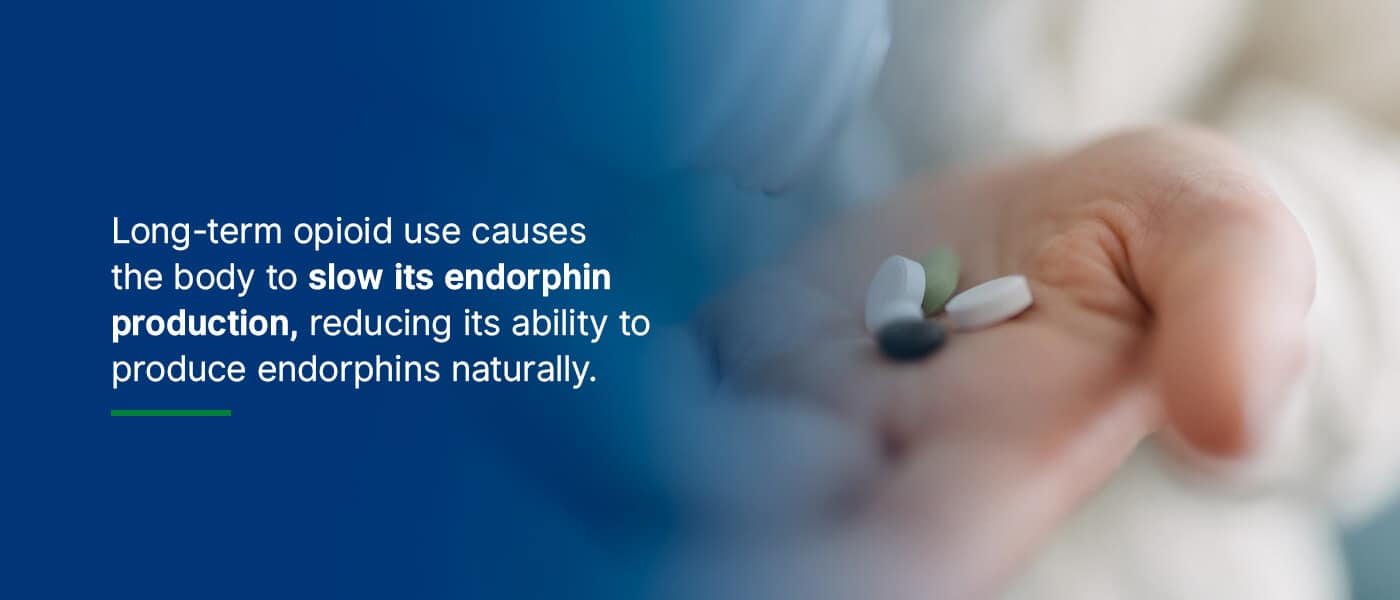Opioid use disorder is a chronic disease characterized by compulsive urges to use opioid drugs, even when they are no longer medically required. The reason these urges are so powerful is that opioids act in the nervous system to produce intense feelings of pleasure and pain relief.
In 2018, the Centers for Disease Control and Prevention (CDC) published data that showed that over 100 people in the U.S. die after overdosing on opioids every day. The dependence on opioids — including heroin, prescription pain killers and synthetic opioids like fentanyl — is considered a national crisis.
Several factors can lead to opioid use disorder, and some people can become dependent on opioids commonly prescribed for medical reasons. So how does opioid use disorder occur, and what are ways to avoid becoming dependent on opioids? Below, we outline five common causes of opioid use disorder as well as steps you can take to prevent opioid misuse.
Causes of Opioid Addiction
The truth is, any individual who takes opioids is at risk of developing an opioid use disorder. While the length of time you use opioids and your personal history play a role in your likelihood of developing an opioid use disorder, it’s not possible to predict who’s susceptible to eventual misuse of these drugs.
Five factors that can lead to opioid use disorder include:
- Unemployment
- Poverty
- Personal or family history of substance abuse
- History of severe anxiety or depression
- Prior drug or alcohol rehabilitation
How Opioid Addiction Occurs: Most Common Reasons for the Misuse of Prescription Opioids
Approximately 80% of people who use heroin previously misused prescription opioids. Between 20% and 29% of chronic pain patients who use prescription opioids misuse them, and 8%-12% of these patients develop an opioid use disorder. The risk of developing an opioid use disorder depends on various factors. Some of the top reasons individuals misuse opioids include the following:
- Physical pain relief
- Pleasurable or euphoric feelings
- Relaxation or tension relief
- Help with sleeping
- Help coping with emotions
- Physical dependence on opioids
- Experimentation
- To increase or decrease other drug effects
Prescription Opioid Abuse and Heroin Use in the U.S.
Prescription opioids and heroin are both opioid drugs and overlap in essential ways. Current research confirms:
- Prescription opioid users rarely use heroin.
- However, prescription opioid use can increase the risk of heroin use.
- Prescription opioid drugs and heroin have different risk factors but similar effects.
- Increased availability of drugs is correlated to increased use and overdose.
- Heroin users are often drawn to its high availability and low cost.
When individuals develop a tolerance to or dependence on prescription opioids, they may seek the drug in higher doses or alternative forms. Since heroin is easier and relatively cheaper to obtain than prescription opioids often are, many people may use it to achieve the same euphoric effects as prescription opioids. Heroin carries more health risks and a higher risk of overdose than prescription opioids.
What Leads to Opioid Addiction?
Opioid pain relievers are generally safe when taken as prescribed and for a short period. However, because opioids are known to produce euphoria in addition to pain relief, they can lead to misuse and a substance use disorder. Even when taken according to directions, opioids may lead to interactions with other medications and substances as well as dependence. Taking prescription opioids longer than a few days can lead to tolerance or dependence and increase the risk of developing a substance use disorder.
Opioid use disorder develops when continued opioid misuse alters the brain. If an individual’s continued opioid misuse causes health issues or prevents them from meeting school, work or family responsibilities, they may have a substance use disorder. Substance use disorders are temporary or chronic illnesses that range from mild to severe.
When people use opioids as prescribed for a short time, they have a lower risk of developing opioid use disorder. However, if they take opioids in higher doses, for longer periods or against their doctor’s instructions, they may experience withdrawal symptoms when they try to stop using opioids and develop an opioid use disorder.

How Opioid Addiction Occurs
Short-term opioid use can cause side effects such as drowsiness, slowed breathing, confusion, constipation, nausea and euphoria. Opioids attach to and activate opioid receptors in the brain, spinal cord and other organs. By activating receptors, opioids release endorphins and dopamine in the brain to block pain signals from the body. Dopamine is a neurotransmitter that increases feelings of pleasure and well-being, and endorphins are hormones that produce a similar effect.
Long-term opioid use causes the body to slow its endorphin production, reducing its ability to produce endorphins naturally. It also reduces the feel-good effects of a person’s regular opioid dosage, which means they develop an opioid tolerance and must take higher doses to feel the same effects. Tolerance can lead to increased use because people will sometimes seek higher doses to achieve the effects they’re used to.
Long-term opioid use can also cause dependence. When opioids affect a person’s brain and body over a long period, they become dependent on the drug. This means that they experience withdrawal symptoms when they stop using the drug. Withdrawal makes it difficult to stop using opioids and can include mental and physical symptoms such as the following:
- Muscle aches
- Insomnia
- Sweating
- Yawning
- Anxiety
- Agitation
- Increased tear production
- Abdominal cramps
- Nausea and vomiting
- Diarrhea
- Dilated pupils
- Goosebumps
How to Avoid Becoming Addicted to Opioids
If you are concerned about developing an opioid use disorder, try discussing your worries with your doctor or medical professional. In instances where you are experiencing intense pain, know there are a few non-opioid options that could help. Talk to your doctor about pain relief alternatives.
Other actions you can take to avoid developing an opioid use disorder include:
- Avoid opioids if you have a history of substance misuse or substance use disorder.
- Discuss your other medications with your doctor.
- Only take opioids for as long as necessary.
- Do not increase your opioid intake.
- Only take opioid medication that is prescribed to you and not someone else’s.
- Follow all prescription guidelines.
- Take the medication as directed and do not crush pills.
- Do not take opioids with alcohol.
- Follow up with your physician as directed.
- Make sure you understand the signs of an overdose.
- Ask your pharmacist about other drugs that may interact with your opioid prescription.
Contact Your Local MedMark Treatment Center If You or a Loved One Has Become Addicted to Opioids
MedMark Treatment Centers specializes in medication-assisted treatment (MAT) for opioid use disorder. Medication-assisted treatment aims to satisfy the brain’s need for extra opioids and slowly reduce its reliance on the drugs over time.
For over 50 years, MedMark Treatment Centers have used MAT medications such as buprenorphine and methadone to activate the body’s opiate receptors and block the effects of opiate drugs, thus discouraging patients from using them. MAT at our treatment centers across the U.S. includes counseling to help patients learn coping skills for overcoming the stress involved with recovery and withdrawal.
MedMark has treatment center locations across the United States that are state-licensed, federally certified and accredited by the Commission on Accreditation of Rehabilitation Facilities (CARF). Our team is committed to giving you the care you need throughout treatment and recovery from substance use disorders so that you can live a more fulfilling life. Substance misuse does not define you, and help is available.
If you suspect you or a loved one has developed an opioid use disorder or would like more information on how to avoid becoming dependent on opioids, contact a MedMark Treatment Centers representative or find a clinic near you to start the path to recovery today.

